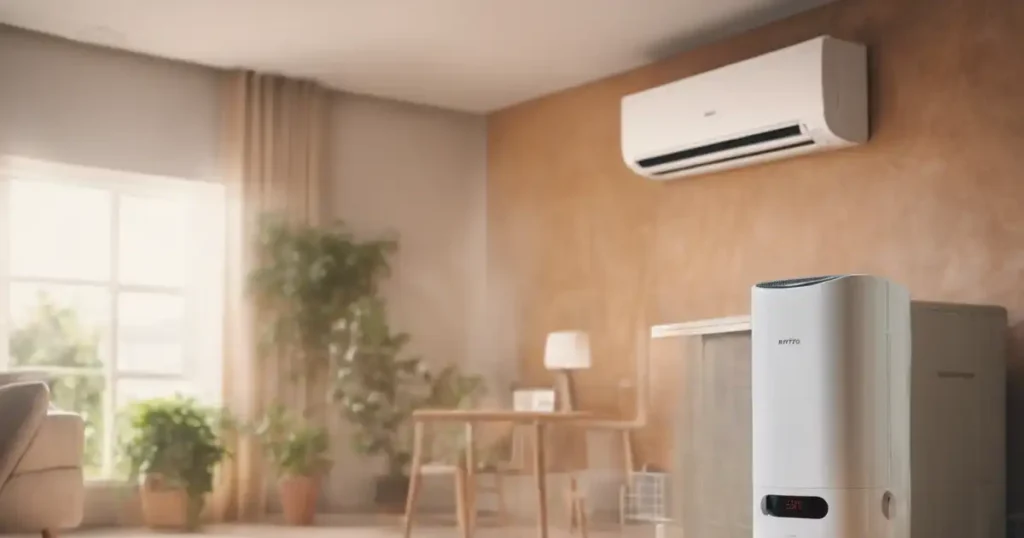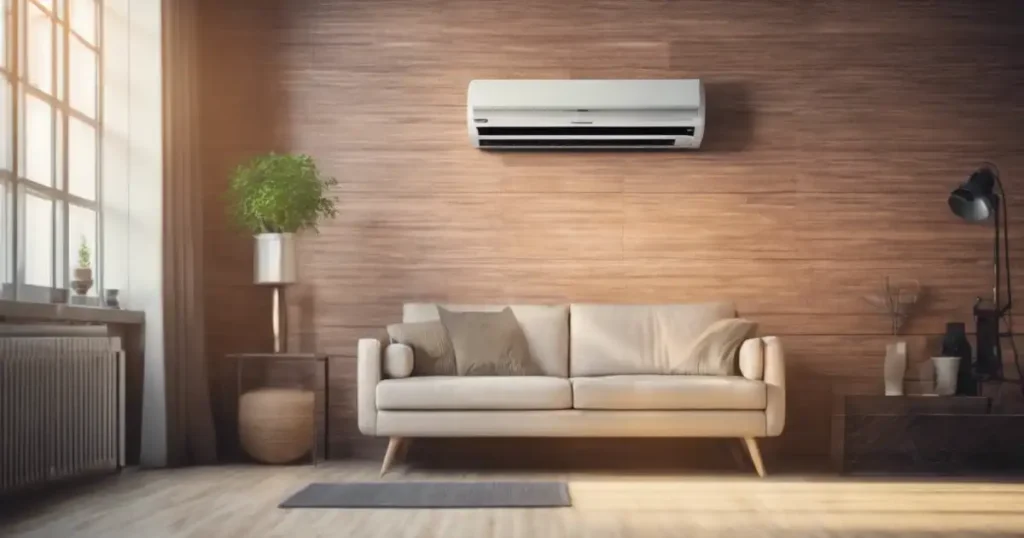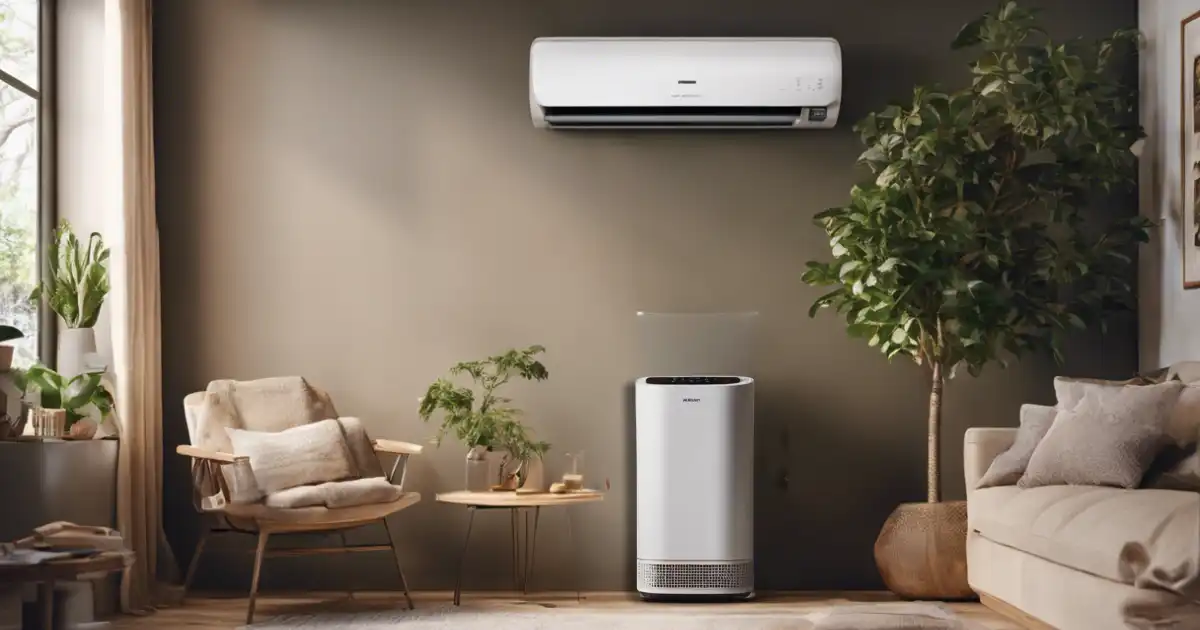Do you ever feel like the air in your home is stuffy or filled with allergens and pollutants? Have you considered getting an air purifier or air conditioner to help clean and circulate the air? But you are not sure if you can use both devices together.
The Short Answer: You can totally use an air purifier with an air conditioner. While the air conditioner keeps things cool, the air purifier takes care of airborne pollutants. Together, they make your indoor space comfy and super fresh.
Ready to transform the air in your home from stuffy to refreshingly pure? Keep reading to explore the difference between purifiers and air conditioners. We’ll discuss important factors to consider before using these devices together. Let’s dive in!
Air Purifier vs Air Conditioner – What’s the Difference?
– What is an Air Purifier?
An air purifier is a standalone unit, usually portable, that filters and purifies the air in a Space. It uses various filtration methods to trap pollutants like dust, pollen, mold, smoke, viruses, etc. Key components include:
- Pre-filter: Designed for capturing large particles.
- HEPA Filter: Effectively captures fine particles.
- Activated Carbon Filter: Captures odors and gasses for improved air quality.
- UV Light Technology: Some models utilize UV light for enhanced purification.
Purifiers pull air in, filter it through these air filters, and then emit cleaner, purified air back out. This cycles and recycles room air to gradually reduce levels of air pollutants and irritants. So, Incorporating an air purifier into your living space is an effective strategy to combat poor indoor air quality, ensuring a consistently fresh and healthy environment.
– What is an Air Conditioner?
An air conditioner serves a handy job of cooling the hot indoor air during hot weather. It works by removing heat from the air and then blowing out cooler air. This makes it feel crisp and comfortable inside, even when it’s miserably hot outdoors.
Air conditioners have a refrigerant chemical that absorbs heat as it cycles between gas and liquid form. Fans blow indoor air across cold AC coils, cooling it before pumping it back out. This transfer of heat from inside to outside is how an air conditioner provides chilling relief!
Now that we understand the basic mechanism of these appliances, let’s see if they can work together.
Can I Use an Air Purifier with an Air Conditioner?

Using an air purifier and air conditioner simultaneously is perfectly safe in most home environments. In fact, operating the appliances together can really optimize your indoor comfort and air quality all summer long.
While the air conditioner chills and dries the interior air, the purifier can work concurrently to trap and filter dust, pollen, mold spores, bacteria, pet dander, smoke particles, and chemicals.
This thorough filtration makes the indoor breathing environment healthier, especially for those with allergies or respiratory issues. The air conditioner tackles temperature and humidity while the purifier scrubs out the majority of hazardous contaminants floating around. It’s an unbeatable pair!
Here are some perks of operating a purifier with your A/C:
- Enhanced Filtration – Get cleaner air by combining the basic filtration in your central air conditioning with the advanced filtration technologies of an air purifier designed to capture microscopic particles the A/C misses.
- Better Circulation – Well-placed purifiers boost localized air circulation, which improves airflow from your central air conditioning ducts for more efficient cooling and ventilation.
- Fewer Allergy Symptoms – Using both appliances means more filtered, allergen-free air circulating to provide relief for allergy and asthma sufferers.
- Reduced Odors & Chemical Pollutants – Activated carbon filters in air purifiers help remove odors, gas contaminants, and volatile organic compounds (VOCs) that standard A/C lacks.
Is an Air Purifier the Same as an Air Conditioner?
While air conditioners and air purifiers both impact indoor air quality, they serve very different primary functions. So you shouldn’t rely on one to entirely replace the other.
Air conditioners, as their name suggests, mainly provide conditioned air for climate control and dehumidification. And purifiers focus specifically on trapping and eliminating airborne particles through filtration without directly cooling or dehumidifying the air.
– Breaking Down the Differences
This comparison table clearly outlines what sets the appliances apart:
| Aspect | Air Purifier | Air Conditioner |
|---|---|---|
| Main Job → | Filters and traps dust, pollen, mold, germs | Cools and dehumidifies indoor air |
| How It Works → | Draws in air and pulls it through filters to capture particles. Releases clean air | Refrigerant coils cool and dry the air. Fan distributes air |
| Main Components → | HEPA filter, activated carbon filter, ionizer, UV light | Refrigerant coils, compressor, dehumidifier pan, fan |
| Ideal For → | Improving indoor air quality and breathing environment | Regulating temperature and humidity levels |
You can think of purifiers as filling a missing niche – cleansing your air with medical-grade particulate removal that air conditioning lacks. This makes them ideal complementary appliances.
In summary – air purifiers and air conditioners have distinct advantages that make them uniquely equipped for their respective jobs. Using them together gives you the full suite of temperature control, moisture regulation, and air cleaning.
Does an Air Conditioner Purify Air?
– Air Conditioners: Cooling, Not Purifying
Air conditioners, by design, lack the sophisticated filtration systems found in dedicated air purifiers. Their primary function is to cool and remove moisture from the air, ensuring a comfortable indoor climate.
The cooling process involves a basic filter that captures some debris during air circulation as part of the cooling mechanism. However, it is very important to note that this filtration is preliminary and aimed at maintaining the efficiency of the cooling system.
– The Basic Filtration of Air Conditioners
While air conditioners or HVAC systems do capture some basic debris like dust and larger particles, their filtration capabilities are limited compared to the advanced systems incorporated in purifiers.
The filters in air conditioners are not designed to tackle microscopic pollutants or eliminate allergens, making them less effective in providing a truly purified indoor environment.
– True Air Purification
Air purifiers contain special filters like HEPA and activated carbon and have multiple internal filtration stages to clean the air of harmful contaminants deeply. Air conditioners simply lack these specialized air cleansing capabilities.
So while air conditioners remove some basic debris, only an air purifier truly purifies the air in a space. Pairing both appliances provides the best whole-home air improvement.
6 Factors to Consider Before Using These Devices Simultaneously

If you decide to use a purifier along with your existing A/C system, here are some factors to consider first. Following these guidelines allows you to operate your air conditioning system and air purifying devices concurrently without issues.
1. Purpose and Compatibility:
Understand the primary purpose of each device. Air purifiers focus on improving indoor air quality, while air conditioners primarily regulate temperature. Assess if both are necessary for your specific needs and if they complement each other effectively.
2. Room Size and Placement:
Consider the size of the room you intend to treat. Purifiers are generally more effective in smaller spaces, addressing localized air quality concerns. Air conditioners, on the other hand, are designed for larger areas. Ensure that both devices are appropriately sized for the room to avoid overworking or underutilizing either.
3. Energy Consumption:
Be mindful of the energy consumption of both devices. While air purifiers typically have lower energy requirements, air conditioners can be significant energy consumers. Using them simultaneously may increase your overall energy usage. Choose energy-star-certified models for better performance with low consumption.
4. Maintenance Requirements:
Both air conditioners and air purifiers demand regular maintenance. Purifiers necessitate filter replacements and periodic cleaning, while air conditioners require filter cleaning, refrigerant checks, and overall system maintenance. Ensure that you’re prepared to commit to the upkeep of both devices to maximize their effectiveness.
5. Noise Levels:
Assess the noise levels of each device, especially if they will be operating simultaneously. Purifiers are generally quieter, while air conditioners can produce more noticeable noise, especially at higher settings. Consider the impact on your comfort and the noise tolerance of the environment.
6. Climate and Seasonal Variations:
Consider the climate in your region and whether you primarily use the air conditioner for cooling or heating. In some seasons, you may only require one of the devices, allowing you to optimize energy usage and save on operational costs.
Bottom Line
The answer to the question, “Can I Use an Air Purifier with an Air Conditioner?” is a resounding yes. These devices, each with its unique strengths, come together to create a harmonious indoor environment that is both cool and refreshingly pure.
Using both appliances in tandem provides the full suite of climate control, moisture regulation, and advanced air cleaning that air conditioners alone cannot match. Considerations such as room size, maintenance, and energy consumption are pivotal in maximizing the benefits of this tandem.
With mindful operation, these appliances can work together to optimize the climate while scrubbing out microscopic allergens, chemicals, and odors the AC misses. Overall, combining an air purifier and air conditioner lets you beat the heat while breathing easier all season long.
FAQs
Do I need an air purifier if I have AC?
Yes, having an air purifier alongside your AC is beneficial. While ACs primarily regulate temperature, they lack advanced air purification. A purifier complements your AC by actively trapping and filtering airborne pollutants, providing a dual solution for a cooler and cleaner indoor environment.
Do air purifiers work with central air?
Absolutely! Air purifiers work seamlessly with central air systems. While central air or HVAC systems regulate temperature, they may not comprehensively filter out contaminants. Adding a purifier enhances the air-cleaning process, capturing microscopic particles and allergens and ensuring a healthier and fresher indoor environment when paired with your central air system.
Can I put a HEPA filter in my AC unit?
While it might be tempting, it’s generally not recommended to directly replace your AC unit’s standard filter with a HEPA filter. HEPA filters can restrict airflow in some systems, potentially causing strain on the AC unit and reducing its efficiency. However, you can use a separate air purifier with a HEPA filter in conjunction with your AC to get the benefits.
Can one air purifier clean an entire house?
The effectiveness of one air purifier in cleaning an entire house depends on factors like the size of the house, airflow, and the type of filter. In some cases, you may need multiple units for comprehensive coverage.

